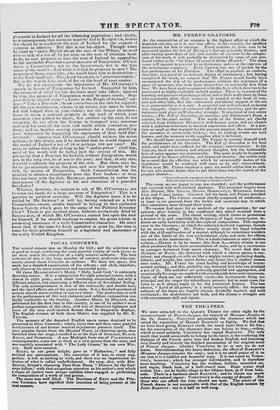VOCAL CONCERTS.
THE second concert was on Monday the 15th; and the selection was as good as usual, combining the same grateful variety of such pieces as are most worth the attention of a really musical audience. The best evidence of this is the large number of eminent professors who con- stantly attend these Concerts as auditors. We have not space, this week, for a detailed examination of the scheme ; and shall, therefore, only glanceat its most prominent and successful parts.
Of these MENDELSSIIIIN'S Motet, " Holy, Lord God," is eminently deserving notice. It is a composition for eight principal voices, with a
chorus in eight parts ; each choir sustaining, occasionally, not only a different subject, but expressing a different class of devotional feeling. The only accompaniment is that of the violoncello and double bass, and the vocal effects are of the purest style. It is a finished specimen of ancient church music written in our own times. The production as well as the performance of this very elaborate and sublime composition was
highly creditable to the Society. Another Motet, by MOZART, also
performed for the first time in this country, is one of its author's most perfect compositions of this class, with less of theatrical lightness and more of the true ecclesiastical flavour than he frequently displays. The English version of both these Motets was supplied by Mr. E. TAYLOR.
The memory of the departed English opera seems destined to be preserved in these Concerts; where, every now and then, some grateful reminiscence of our former musical enjoyments presents itself. The
once popular Sestet from the Haunted Tower, (a charming opera, now banished from the stage,) recalled to us the days of Seonace, BLAND, KELLY, and SEDGWICK. A new Madrigal, from one of PALESTRINA'S contemporaries, came out as fresh as a new guinea from the mint, and was worthily associated with " The Lady Oriana," by our own WIL- BYE. Both were encored.
BALFE, to out great delight, gave us " Madamina; " and fully realized our anticipations. His execution of it was, in every way, perfect: it left us nothing to wish, and there was no impertinent in-. trusion of what is called embellishment. He sang, also, with Mrs. SEGUIbl, SPOHR'S charming Duet from Faust, "Dearest, let thy foot- steps follow," with that scrupulous attention to his author's text which a singer of correct taste always exhibits when engaged in performing the composition of a work of real genius.
The room was well filled. The Dutehess of Kora and the Prin- cess Vic-Tome have signified their intention of being present at the next concert.


























 Previous page
Previous page